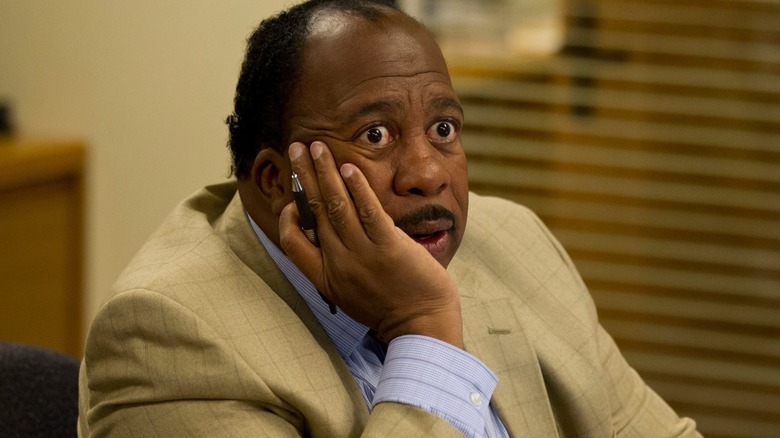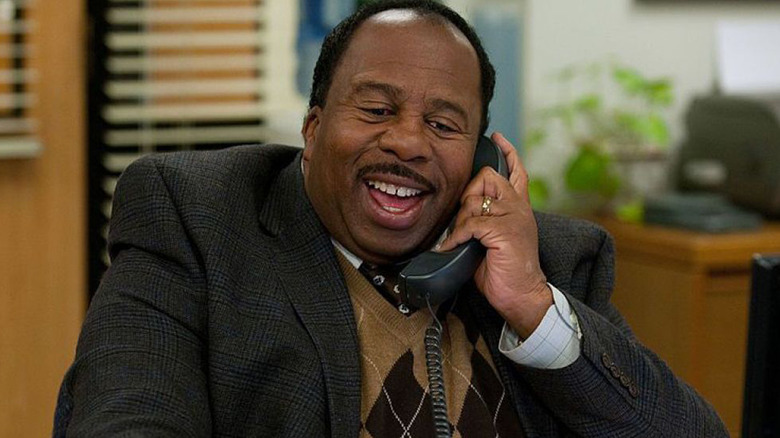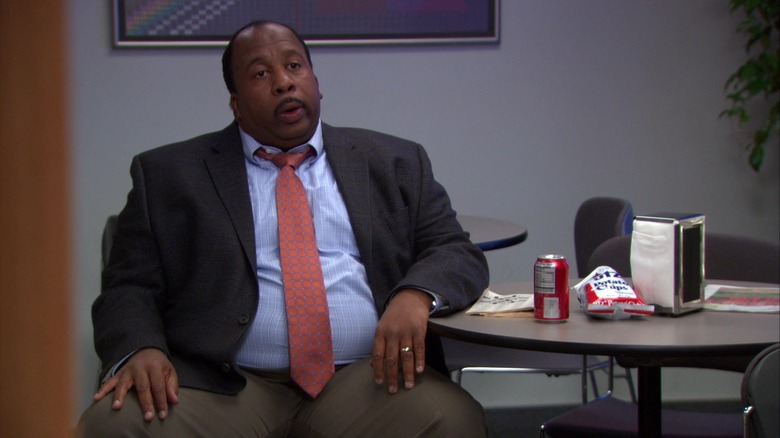The Hilarious Stanley Theory That Changes Everything On The Office
Leslie David Baker, who portrayed salesman Stanley Hudson, is only one of five actors to appear in every single episode of "The Office." Though Stanley might not be the first character with who fans might associate the series, he joins names like Dwight Schrute (Rainn Wilson) and Jim Halpert (John Krasinski, back in the years before his transformation to action hero stardom) on that exclusive list of true Dunder Mifflin mainstays.
In the wake of Baker's time on the "The Office" coming to a close, the actor has generally popped up in various supporting roles, in quite a wide variety of projects. Even now, though, his career remains defined in large part by the show. Not only did Baker tell an interviewer with Tomorrow Comes Movies at the 2018 Los Angeles Comic-Con that he would be open to an "Office" reunion, but he even began attempting to finance a spin-off about Stanley through Kickstarter in 2020. In fact, the Kickstarter campaign ultimately raised enough money to shoot a pilot for the series, titled "Uncle Stan." As described, the show aimed to focus on the relationship between Stanley and his nephew, Lucky, who comes to his uncle for guidance when he starts up his own hybrid florist-motorcycle business.
Since 2020, unfortunately, there's been no word on "Uncle Stan." However, like most of his co-stars, Baker continues to be both subject and object of the enduring passion for "The Office," which that has lasted well past its finale.
However, here's a strange thought: what if Stanley isn't merely a reliable supporting player in "The Office," but actually the show's low-key most important character? According to an unlikely, yet compelling fan theory shared to Reddit, about half of the episodes of "The Office" might take place not in reality, but within Stanley's psyche.
Dunder Mifflin is Stanley's personal hell
According to Reddit user JesusHMontgomery, who appropriately shared their theory to the "FanTheories" subreddit, a Season 5 episode of "The Office" titled "Stress Relief" might be the most important one in the show's run. In the episode's cold open, Dwight purposefully lights a fire in a trash can in order to set off the office's smoke alarms and test his co-workers' fire preparedness. In the ensuing chaos, Stanley suffers a heart attack, among other, less severe blunders. He ultimately appears to survive without issue and is back at work after a short break, none the worse off.
The Redditor, however, theorizes that Stanley's heart attack was fatal. Everything in "The Office" from the moments following the opening credits of "Stress Relief" to its series finale, then, represent Stanley in Hell, and his supposed co-workers are now demons imitating his onetime officemates. This theory hinges on two assumptions: that the mishaps in Dunder Mifflin are particularly torturous for Stanley, and that the behaviors of various characters shift significantly in and after "Stress Relief."
"Stanley was the person who enjoyed being at the office the least most often refusing to take part in whatever shenanigans were being cooked up," JesusHMontgomery argues. "Hell for him is the office... but worse."
One could argue, if you buy the initial theory, that vague hints are placed throughout the show. The most notable? In the 2009 episode "Secret Santa," there's an exchange between Stanley and Michael Scott, where Stanley opens a gift — a scented candle — and Michael taunts Stanley with the argument that he'll be facing punishment for cheating on his wife. "Lots of fire where you're going," Michael says, "better get used to it. You're going to H-E-L-L double hockeysticks. Going to hell, Stanley."
Does the 'Stanley in Hell' theory check out?
To be fair, Stanley does appear to be perpetually grumpy. Of course, as with so many fan theories, this one begins to collapse under scrutiny, since plenty of moments that ensue, both good and bad, don't concern him whatsoever. The latter point, JesusHMontgomery argues, is based purely on their own observations of a shift in writing quality beginning specifically with "Stress Relief" and continuing into subsequent seasons.
Some of the other Reddit users, as usual, raised concerns with the theory. For instance, as user Pipthepirate wrote: "The last time I checked hell doesn't reward people with free meatballs."
Alternatively, user Dilnob took things to the next level: "Creed is clearly satan if your theory holds any validity. Killed a guy that crossed him and took his name and identity. No morals to speak of."
The truth, of course, is that fan theories are just that — fan theories. They usually don't make sense, but they provide a fun way to re-watch old episodes. And as it is with many fan theories, the creative minds behind "The Office" almost certainly did not plan most of the show's run to make it look like it was Stanley's personal hell, particularly since there is no such revelation contained in the final episode. Nonetheless, a watch-through of episodes after Stanley's heart attack, with this theory in mind, can shed entirely new light onto what is, for many, an old favorite.


